The journey to becoming a patient of New York Bariatric Group generally starts when someone becomes frustrated with repeated, failed attempts to lose weight. We treat adults and adolescents who have struggled with obesity, and often also have health conditions associated with extra weight.

Despite the myth that obesity can be treated by simply “eating less and exercising more,” weight loss, especially in the obese population, is more complicated than that. The weight loss experts at New York Bariatric Group are well aware of the biological, metabolic, psychological, and social barriers to losing weight and keeping it off.
Gastric Bypass Journey
What is Gastric Bypass?
The Roux-en-Y gastric bypass procedure is usually performed laparoscopically (i.e. keyhole surgery with a telescope). In this gastric bypass operation, the stomach is completely divided with a stapler to leave a pouch that initially measures only 25 mls. The small bowel is divided and the divided end is brought up and joined to the small stomach pouch. The other small bowel end is joined back onto the small bowel about a meter down from the stomach. Thus the whole stomach is bypassed apart from a tiny pouch. This operation works in two ways:
- Restriction: the small pouch restricts the volume of food you can eat at one meal.
- Malabsorption: the reconfiguration of the small intestine, results in some of the food you eat passing through the intestine without being absorbed.
What Are The Advantages Of Gastric Bypass?
Gastric bypass is an effective weight-loss operation in most patients (the operation is the tool, in the end, success is dependent on how well the tool is used). Advantages of gastric bypass:
- More rapid weight loss than banding
- The discomfort of dumping offers a useful deterrent to eating high calorie food and drinks
- Long track record- the gastric bypass operation has been around in various forms for 30 years
- No foreign object to break or erode
- Most patients lose 60-70% EWL over 2 years
Gastric Bypass and Diabetes
Diabetes is a leading cause of death in the United States, so it is important to recognize that the gastric bypass can be a particularly good choice for patients who have type 2 diabetes. In studies, patients with diabetes who undergo gastric bypass surgery experience a remission of their diabetes, often within a day, after their operation. This is particularly interesting because there is no way that the weight loss over a few days could lead to remission of diabetes. There appears to be a physiological change that happens from gastric bypass surgery that may treat diabetes. Although this is not the case for all patients, those with diabetes should be considered for gastric bypass surgery. According to the American Society for Metabolic and Bariatric Surgery (ASMBS), approximately 80% of patients who have gastric bypass surgery go into remission of their type 2 diabetes.
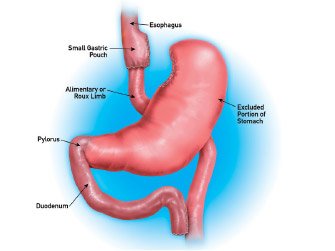
What Are The Disadvantages Of Gastric Bypass?
Disadvantages of gastric bypass:
- This procedure has a slightly higher serious complication rate than some of the other operations because of multiple staple lines and bowel connections that can potentially leak.
- There is a need to take oral supplements of iron, vitamins, and calcium for life, and some patients will also need Vitamin B12 injections.
- Recovery time is slightly longer than after other procedures.
How to Get Started?
- The Insurance experts at the New York Bariatric Group will verify your insurance benefits for you free of charge.
- The first step is to call or contact us to make an appointment with one of the experienced surgeons at the New York Bariatric Group.
- As a candidate for bariatric surgery, you can expect to undergo a series of consultations and evaluations. A detailed comprehensive program has been developed to ensure your long-term health and safety pre-and post-surgery.
- Dr. Garber explains how you can initiate the process to become a new healthier you.
- You will receive extensive patient education from our psychologist who will perform a psychological evaluation that is required by the hospital and most insurance providers.
- Meet with our registered dietitian to discuss healthy lifestyle changes pre- and post-weight loss surgery.
- Participate in studies to determine your pulmonary, gastrointestinal, and cardiovascular health. You can usually complete this entire work-up in one day in our office.
- After the workup is completed you will meet with your surgeon for a second visit to be scheduled for surgery. Our insurance experts will then obtain approval from your insurance company.
- You will be scheduled for preadmission testing at the hospital. During this testing, you will meet our bariatric coordinator who will give you a complete educational class on how to prepare for surgery, what will happen when you arrive at the hospital on your surgery day, as well as what to expect when you go home from the hospital.
Day of Surgery and Recovery
It is important to remember that The New York Bariatric Group and its affiliate Bariatric Center has been recognized as a “MBSAQIP and its Accredited Center-Comprehensive”. This designation provides the public with the assurance that our practice provides complete care for patients before, during, and after bariatric surgery, and that we have a proven track record verified by an independent review organization.
Based on this designation, we have proven that your hospital stay will provide all that is necessary for a fast and pleasant recovery. From our full time bariatric nurse coordinator to specialized equipment that is needed to fulfill the needs of patients post-bariatric surgery, including bariatric chairs, beds, gowns, and other specialized equipment, our program is designed solely for the purpose of the bariatric patient.
The surgery usually takes only 75-90 minutes and is performed under general anesthesia. You will usually spend two nights in the hospital. On the first morning after the surgery you will undergo a GI series to make sure everything looks good. You will then be started on a liquid diet. On postoperative day two, you will start on a pureed diet. Once you are tolerating pureed food you will be discharged home.
Recovery Period
The recovery period after Gastric Bypass surgery is usually about 2 weeks until you can return to work.
Lifestyle Changes After Gastric Bypass Surgery
After Bariatric Surgery Lifestyle Changes
Adjusting to your post bariatric surgery diet and lifestyle is one of the most important keys to your long-term success. Develop healthy daily nutrition and exercise habits. Connect with your fullness cues. Avoid reverting to old habits that led to poor health, fatigue, depression, and attempts at binge eating. Making a commitment to lifestyle change will bring fast & substantial weight loss. Let us show you how.
Is permanent weight loss after bariatric surgery possible? Absolutely! But you aren’t going to find weight loss success by merely having restrictive weight loss surgery. Get thin quick schemes are a dime a dozen. They are usually costly plans that promise fast weight loss. They work too – temporarily. The problem with fast weight loss plans alone is they are not long-term solutions to losing weight and keeping it off.
Tips To Avoid Feeling Deprived While Dieting (Even Before Entering Our Program)
- Learn and adhere to a sensible diet plan
- Focus on making a lifestyle change, rather than looking for a quick fix
- Find a new and exciting way to stay motivated
- Indulge in your bariatric treats once in a while
- Find enjoyment in activities other than eating
- Reward yourself for reaching weight loss goals, but not with food.
- Connect with friends and ask for support
- Be accountable for your eating, even on your down days.
- Eat small meals at specific schedules to avoid feeling hungry
- Don’t skip meals
- Create lighter versions of your favorite meals that you can enjoy eating
Post-Surgery Diet
Post-bariatric surgery diet guidelines are fully discussed with patients during their comprehensive nutritional evaluation prior to surgery. Patients follow a Stage I diet for the first 4-6 weeks after surgery. This includes all foods that are soft, mushy, and/or pureed consistencies. Examples of pureed foods are anything blended and smooth such as baby foods, fruitless yogurt, cottage cheese, and hummus. Soft/mushy foods include chopped up ground meats such as turkey, veal, chicken or pork, soft, white, flaky fish that is baked, broiled or grilled, scrambled eggs, and egg whites. Solid foods of all kinds should be completely avoided until weeks 4-6 or when the surgeon allows it.
This practice stresses the importance of good hydration, using non-carbonated, decaffeinated, sugar-free beverages. We always promote good quality proteins to be consumed from day one after bariatric surgery. High sugar and high-fat foods are limited and very specific guidelines are provided to help equip patients with a clear-cut way to determine which foods are healthy for them to eat. Fruits, vegetables, and high fiber foods are reintroduced after the first 3 months. All patients get full details on dietary progression from our experienced nutritionists at their follow-up visits.
The New York Bariatric Group is fully dedicated to promoting high standards for nutritional health. That doesn’t mean that patients should not enjoy eating. The New York Bariatric Group weight loss program has been designed to help patients lose weight rapidly, but provides you with resources to help enjoy your new lifestyle by keeping the flavor and fun in eating. Each patient is given the option to enroll in our Store. We brought together great tasting meals and supplements for breakfast, lunch, dinner, and even snacks which can be ordered on our website.

Before

After
Lap-Band Surgery
What is the Lap Band?
Popularly known as the LAP-BAND®, a gastric band is a hollow band made of special material that is placed around the stomach near its upper end, creating a small pouch and a narrow passage into the larger remainder of the stomach. The band is then inflated with a salt solution. Following the initial surgery, the band itself can be tightened or loosened over time to change the size of the passage by increasing or decreasing the amount of salt solution.
Watch VideoIn certain patients, we can do this with a single incision in your belly button, so a scar is barely noticeable.
How Does The Lap-Band Surgery Work?
In the surgical procedure, the band is placed around the upper part of the stomach, creating a small pouch that can hold only a small amount of food. The narrowed opening between the stomach pouch and the rest of the stomach controls how quickly food passes from the pouch to the lower part of the stomach. The system helps the patient eat less by limiting the amount of food that can be eaten at one time and increasing the time it takes for food to be digested.
Depending on the patient’s needs, after the device is implanted via the initial surgery the narrowed opening between the pouch and the lower part of the stomach can be adjusted in size by inflating or deflating the hollow band. Inflating the band makes the opening smaller, causing food to pass more slowly. Deflating the band makes it wider, and causes food to pass more quickly. This adjustment is made by adding or removing fluid inside the hollow band. The doctor does this by injecting or removing the fluid through a small button-like part called the access port. This access port is placed under the skin in a muscle in the chest wall. The port is connected to the band by the tubing. Learn about the adjustments of the band post-op below.
Advantages Of Lap-Band Surgery?
Gastric banding is the most simple of the bariatric surgery options, and leads to the smallest number of serious complications. LAP-BAND patients often return to work in just a week or two. Another advantage of this weight loss treatment is that the band is adjustable. This means that the surgeon can change the level of fluid in your band at a quick office visit. Adding fluid makes the band tighter, and removing fluid makes the band looser. Each patient is different, so as time goes on you will work with our team and can call the office any time your band feels too loose or too full.
Another advantage of the band is that it is reversible. Although the band is meant to stay in place permanently, if there are side effects or other reasons to remove it, this is an option. No cutting or stapling is done, and the anatomy of the body is not changed at all when the gastric band is put in place. The LAP-BAND also does not have a malabsorption risk, like other procedures. When part of the stomach is removed or the intestines are rerouted, patients’ bodies absorb fewer nutrients which can lead to negative health consequences, especially if they do not follow their vitamin and supplement routine. Because the LAP-BAND has no risk of malabsorption, there would be no extra vitamin deficiencies to worry about.
Watch VideoDisadvantages Of Lap-Band?
Most patients experienced at least one side effect. Common side effects include nausea and vomiting, heartburn, abdominal pain, and slippage of the band. The most serious side effects required either another operation or hospitalization.
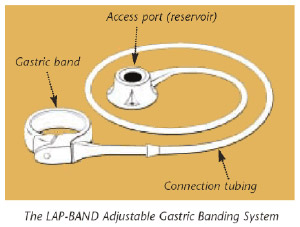
Because of the LAP-BAND design, it can be tempting to ‘cheat’ on your diet. Foods like chocolate or ice cream are easy to eat with the band, so it is important that patients commit to the eating changes that need to go with the surgery in order for it to be successful. It is also possible for food to get stuck if you take bites that are too big or do not chew your food very carefully. This can be uncomfortable and potentially dangerous. Patients must be mindful of eating carefully with the band. Most patients experience at least one side effect when they have a LAP-BAND. Common side effects include nausea and vomiting, heartburn, and abdominal pain. Some side effects are managed in follow up visits, but the most serious side effects require either another operation or hospitalization. There are risks to the gastric band, just like there are with any surgical procedure. These risks include prolapse, pouch dilatation, band erosion, infection of the band, or port leak.
When Should It Not Be Used?
An adjustable band procedure should not be used for people who are poor candidates for weight loss surgery, have certain stomach or intestinal disorders, have an infection, have to take aspirin frequently, or are addicted to alcohol or drugs. It should not be used on patients who are not able or willing to follow the rules for eating and exercise that are recommended by the doctor after surgery.
How To Get Started?
- The Insurance experts at the New York Bariatric Group will verify your insurance benefits for you free of charge.
- The first step is to call or contact us to make an appointment with one of the experienced surgeons at the New York Bariatric Group.
- As a candidate for bariatric surgery, you can expect to undergo a series of consultations and evaluations. A detailed comprehensive program has been developed to ensure your long-term health and safety pre- and post-surgery.
- Dr. Garber explains how you can initiate the process to become a new healthier you.
- You will receive extensive patient education from our psychologist who will perform a psychological evaluation that is required by the hospital and most insurance providers.
- Meet with our registered dietitian to discuss healthy lifestyle changes pre- and post- weight loss surgery.
- Participate in studies to determine your pulmonary, gastrointestinal, and cardiovascular health. You can usually complete this entire work-up in one day in our office.
- After the work-up is completed you will meet with your surgeon for a second visit to be scheduled for surgery. Our insurance experts will then obtain approval from your insurance company.
- You will be scheduled for preadmission testing at the hospital. During this testing, you will meet our bariatric coordinator who will give you a complete educational class on how to prepare for surgery? What is going to happen when you arrive at the hospital on your surgery day, as well as what to expect when you go home from the hospital.
Day of Surgery and Recovery
It is important to remember that The New York Bariatric Group and its affiliate Bariatric Center has been recognized as a “MBSAQIP and its Accredited Center-Comprehensive”. This designation provides the public with the assurance that our practice provides complete care for patients before, during, and after bariatric surgery, and we have a proven track record verified by an independent review organization. Based on this designation, we have proven that your hospital stay, will provide all that is necessary for a fast and pleasant recovery. From our full time bariatric nurse coordinator to specialized equipment that is needed to fulfill the needs of patients post-bariatric surgery, including bariatric chairs, beds, gowns, and other specialized equipment. At the end of your hospital stay, you will find that our program is designed solely for the purpose of the bariatric patient. The surgery usually takes only 25 – 35 minutes and is performed under general anesthesia. You will usually spend one night in the hospital or sometimes can go home the same day. Once you are tolerating pureed food you will be discharged home.
Recovery Period
The recovery period after Lap-Band surgery is usually just 3 -5 days until you can return to work. With the virtually scarless (SILS) single incision technique, you can sometimes return to work sooner.
Lifestyle Changes After Lap-Band
Adjusting to your post bariatric surgery diet and lifestyle is one of the most important keys to your long-term success. Develop healthy daily habits based on eating in moderation that match your new body instead of failed eating patterns that can ultimately lead to poor health, fatigue, depression, and attempts at binge eating. Making a commitment to lifestyle change will bring fast & substantial weight loss. Let us show you how. Depending on the patient’s needs, after the device is implanted via the initial surgery the narrowed opening between the pouch and the lower part of the stomach can be adjusted in size by inflating or deflating the hollow band. Inflating the band makes the opening smaller, causing food to pass more slowly. Deflating the band makes it wider, and causes food to pass more quickly. This adjustment is made by adding or removing fluid inside the hollow band. The doctor does this by injecting or removing the fluid through a small button-like part called the access port. This access port is placed under the skin in a muscle in the chest wall. The port is connected to the band by the tubing. Learn about the adjustments of the band post-op below.
Post-Surgery Diet
Post bariatric surgery diet guidelines are fully discussed with patients during their comprehensive nutritional evaluation prior to surgery. Patients follow a Stage I diet for the first 4-6 weeks after surgery. This includes all foods that are soft, mushy, and/or pureed consistencies. Examples of pureed foods are anything blended and smooth such as baby foods, fruitless yogurt, cottage cheese, and hummus. Soft/mushy foods include chopped up ground meats such as turkey, veal, chicken or pork, soft, white, flaky fish that is baked, broiled or grilled, scrambled eggs, and egg whites. Solid foods of all kinds should be completely avoided until weeks 4-6 or when the surgeon allows it.
This practice stresses the importance of good hydration, using non-carbonated, decaffeinated, sugar-free beverages. We always promote good quality proteins to be consumed from day one after bariatric surgery. High sugar and high-fat foods are limited and very specific guidelines are provided to help equip patients with a clear-cut way to determine which foods are healthy for them to eat. Fruits, vegetables, and high fiber foods are reintroduced after the first 3 months. All patients get full details on dietary progression from our experienced nutritionists at their follow-up visits.
The New York Bariatric Group is fully dedicated to promoting high standards for nutritional health. That doesn’t mean that patients should not enjoy eating. The New York Bariatric Group weight loss program has been designed to help patients lose weight rapidly, but provides you with resources to help enjoy your new lifestyle by keeping the flavor and fun in eating. Each patient is given the option to enroll in our Store. We brought together great tasting meals and supplements for breakfast, lunch, dinner, and even snacks which can be ordered on our website.
Success Stories

Before

After
Revision Bariatric Journey
What Is Revisional Surgery?
Although bariatric surgery is usually quite effective, at times, it does not work as well as one would like. In such instances, a revisional bariatric surgery procedure may be considered. It is important to remember that revision operations are more technically challenging and carry a higher complication risk. Patients need to seek out very experienced bariatric surgeons that perform revisional bariatric surgery procedures routinely. Not everyone who regains weight or fails to lose as much weight as they would have liked are candidates for revisional bariatric surgery.
One must stress that morbid obesity is a multi-factorial disease, hence a multi-disciplined approach should be utilized to treat patients that have regained or failed to lose weight. Successful bariatric surgery starts with the operation. Some operations have been done much longer and have been proven to be more durable over time. Postoperative instruction and support are also very important. Snacking behavior, poor water intake, lack of exercise, and poor supplementation intake can all lead to poor outcomes. When patients are being evaluated for a revision in our program, a consultation with the surgeon is scheduled.
Options for Revision
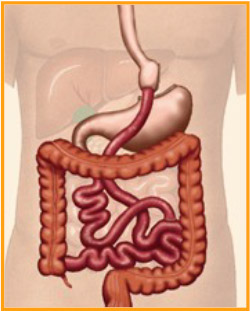
Gastric Bypass
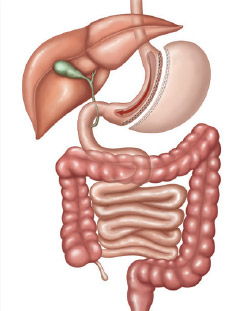
Sleeve Gastrectomy
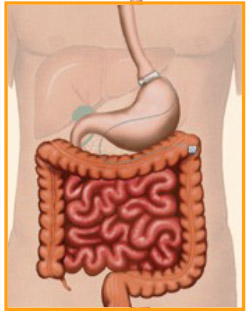
Lap Band
Revision of Sleeve Gastrectomy
Sleeve revision surgery should be considered when the initial sleeve has failed to achieve the desired results. Sometimes a patient who undergoes a gastric sleeve does not experience sufficient weight loss. This could be due to the sleeve being made too large by the initial surgeon (which oftentimes happens early in a surgeon's experience conducting this operation), the sleeve stretching out over time, or the result of poor reduction of calorie consumption. Revision surgery is an excellent option for the first two types of problems whereas the third type patient would benefit mostly from proper instruction and can therefore avoid revisional bariatric surgery. The revisional options for sleeve gastrectomy include Re-Sleeving, placing a gastric band over the sleeve, or converting to a Roux En Y Gastric Bypass.
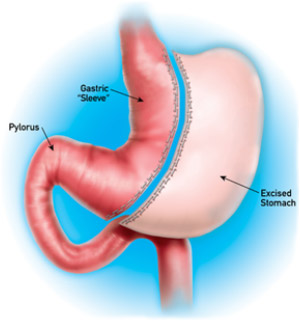
Sleeve Gastrectomy Revision Options
- Re-Sleeving is an excellent option for those patients who have a sleeve that appears too large. After conducting an endoscopy, your surgeon will know first hand if the sleeve appears to have stretched or perhaps was made too large initially. Re-sleeving will involve re-sizing the stomach pouch again in a matter similar to the initial sleeve operation. Most of the time this procedure can be conducted laparoscopically and usually involves just an overnight stay in the hospital and return to light-duty work in approximately 7-10 days. The risks of this surgery (including leaks, bleeding, gastric outlet obstruction) are slightly higher than the initial surgery but are still quite safe.
- Band oversleeve is an excellent option for those patients that appear to have a larger upper portion of the stomach (fundus), but have a narrow middle and lower portion of the stomach. Because of the narrow lower parts of the stomach, an attempt at re-sleeving could cause a blockage to the exiting part of the stomach and that would result in having to convert the patient to a roux en y gastric bypass to “bypass” the blockage.
- Converting to a Roux en Y gastric bypass is an option for patients who have inadequate weight loss, or who have severe reflux after sleeve gastrectomy.
How to Get Started?
- The Insurance experts at the New York Bariatric Group will verify your insurance benefits for you free of charge.
- The first step is to call or contact us to make an appointment with one of the experienced surgeons at the New York Bariatric Group.
- As a candidate for revisional bariatric surgery, you can expect to undergo a series of consultations and evaluations. A detailed comprehensive program has been developed to ensure your long-term health and safety pre- and post-surgery. A pre-operative endoscopy performed by your surgeon is required to see your anatomy and to see if you are a candidate for revisional surgery.
- Dr. Garber explains how you can initiate the process to become a new healthier you.
- You will receive extensive patient education from our psychologist who will perform a psychological evaluation that is required by the hospital and most insurance providers.
- Meet with our registered dietitian to discuss healthy lifestyle changes pre- and post- weight loss surgery.
- Participate in studies to determine your pulmonary, gastrointestinal and cardiovascular health. You can usually complete this entire work-up in one day in our office.
- After the work-up is completed you will meet with your surgeon for a second visit to be scheduled for surgery. Our insurance experts will then obtain approval from your insurance company.
- You will be scheduled for preadmission testing at the hospital. During this testing, you will meet our bariatric coordinator who will give you a complete educational class on how to prepare for surgery? What is going to happen when you arrive at the hospital on your surgery day, as well as what to expect when you go home from the hospital.
Are You A Good Candidate For Revision Surgery?
Several factors that determine if you will be a good candidate for revisional surgery include: 1) What was the initial operation performed? 2) When was the initial operation performed? 3) Where was the initial operation was performed? 4) At what stage was your surgeon in his/her career? 5) Were the postoperative instructions and guidance given after the initial surgery adequate? 5) What was the initial weight loss history following surgery? 6) Were there any complications that occurred following the initial operation?
Lack of proper postoperative instructions and guidance after the initial surgery can result in misleading patients into believing they need a revisional procedure. In this case, the patient never learned the best way to use their new “tool”. It is this type of patient that will benefit considerably from proper instruction and can therefore avoid revisional bariatric surgery. Obtaining the weight loss history following the initial surgery tells us if the operation was ever effective or if it “failed the patient” from the very beginning. If postoperative weight loss never occurred or was minimal, then it is likely that there was a technical problem with the operation, and revisional surgery may be able to correct the problem at the root. Likewise, complications occurring after the surgery may have led to technical problems that have influenced the durability of the weight loss. Such complications may include intraabdominal infections, ulcerations, band infections, and prolonged vomiting postoperatively. Considering bariatric surgery as a “tool” to be used for long-term weight loss, we must determine if the patient has used their “tool” ineffectively or if the patient’s “tool” does not work. If the “tool” has not been used effectively then it is unlikely that a revision would be beneficial. However, if the “tool” is broken or never worked, then a revision may be beneficial.
Day of Surgery and Recovery
It is important to remember that The New York Bariatric Group and its affiliate Bariatric Center has been recognized as a “MBSAQIP and its Accredited Center-Comprehensive”. This designation provides the public with the assurance that our practice provides complete care for patients before, during, and after bariatric surgery, and we have a proven track record verified by an independent review organization.
Based on this designation, we have proven that your hospital stay, will provide all that is necessary for a fast and pleasant recovery. From our full time bariatric nurse coordinator to specialized equipment that is needed to fulfill the needs of patients post-bariatric surgery, including bariatric chairs, beds, gowns, and other specialized equipment. At the end of your hospital stay, you will find that our program is designed solely for the purpose of the bariatric patient.
Revisional surgery time is very variable and is determined by many factors. If your previous surgery was performed through an open incision you will most likely have more scar tissue and the surgery will take longer. The surgery is performed under general anesthesia. You will usually spend one night in the hospital for most surgeries except for gastric bypass usually requires two nights in the hospital. Once you are tolerating pureed food you will be discharged home.
Recovery Period
The recovery period after Revisional Bariatric surgery is usually just 3 -5 days until you can return to work. If you undergo a gastric bypass the recovery could be approximately 2 weeks.
Lifestyle Changes After Revisional Surgery
After Bariatric Surgery Lifestyle Changes
Adjusting to your post bariatric surgery diet and lifestyle is one of the most important keys to your long-term success. Develop healthy daily habits based on eating in moderation that match your new body instead of failed eating patterns that can ultimately lead to poor health, fatigue, depression, and attempts at binge eating. Making a commitment to lifestyle change will bring fast & substantial weight loss. Let us show you how.
Is permanent weight loss after bariatric surgery possible? Absolutely! But you aren’t going to find weight loss success by merely having restrictive weight loss surgery. Get thin quick schemes are a dime a dozen. They are usually costly plans that promise fast weight loss. They work too – temporarily. The problem with fast weight loss plans alone is they are not long-term solutions to losing weight and keeping it off.
- Tips to Avoid Feeling Deprived While Dieting (even before entering our program)
- Learn and adhere to a sensible diet plan
- Think lifestyle change rather than sticking with the diet mentality
- Find a new and exciting way to stay motivated
- Indulge in your bariatric treats once in a while
- Find enjoyment in activities other than eating
- Reward yourself for reaching weight loss goals, but not with food.
- Connect with friends and ask for support
- Be accountable for your eating, even on your down days.
- Eat small meals at specific schedules to avoid feeling hungry
- Don’t skip meals
- Create lighter versions of your favorite meals that you can enjoy eating
Post Surgery Diet
Post bariatric surgery diet guidelines are fully discussed with patients during their comprehensive nutritional evaluation prior to surgery. Patients follow a Stage I diet for the first 4-6 weeks after surgery. This includes all foods that are soft, mushy, and/or pureed consistencies. Examples of pureed foods are anything blended and smooth such as baby foods, fruitless yogurt, cottage cheese, and hummus. Soft/mushy foods include chopped up ground meats such as turkey, veal, chicken or pork, soft, white, flaky fish that is baked, broiled or grilled, scrambled eggs, and egg whites. Solid foods of all kinds should be completely avoided until weeks 4-6 or when the surgeon allows it.
This practice stresses the importance of good hydration, using noncarbonated, decaffeinated, sugar-free beverages. We always promote good quality proteins to be consumed from day one after bariatric surgery. High sugar and high-fat foods are limited and very specific guidelines are provided to help equip patients with a clear-cut way to determine which foods are healthy for them to eat. Fruits, vegetables, and high fiber foods are reintroduced after the first 3 months. All patients get full details on dietary progression from our experienced nutritionists at their follow-up visits.
The New York Bariatric Group is fully dedicated to promoting high standards for nutritional health. That doesn’t mean that patients should not enjoy eating. The New York Bariatric Group weight loss program has been designed to help patients lose weight rapidly, but provides you with resources to help enjoy your new lifestyle by keeping the flavor and fun in eating. Each patient is given the option to enroll in our Store. We brought together great tasting meals and supplements for breakfast, lunch, dinner, and even snacks which can be ordered on our website.
Success Stories

Before

After
Sleeve Gastrectomy Journey
What is the Sleeve Gastrectomy?
With gastric sleeve surgery, we remove approximately 70 - 80% of your stomach, leaving a “sleeve” of the stomach. The surgery reduces the volume of your stomach, thus making you feel full more quickly. The section of your stomach that is responsible for producing the hormone Ghrelin is taken out. This hormone stimulates feelings of hunger, so after the procedure, you can be confident that your hunger levels and thus your food intake will decrease. Patients usually lose approximately 70% of their excess weight with the sleeve gastrectomy. In certain patients, we can do this with a single incision in your belly button, so a scar is barely noticeable. The New York Bariatric Group is proud to be among the first and only surgeons in the area that now offer virtually scarless single incision sleeve gastrectomy, or gastric sleeve surgery, performed completely through the umbilicus. This results in improved cosmesis and quicker recovery when you choose sleeve gastrectomy. Another benefit to vertical sleeve gastrectomy is that most patients usually spend only one night in the hospital, while the recovery time for bypass surgeries is longer. Ask your surgeon if you qualify for the new virtually scarless SILS sleeve gastrectomy.
Watch VideoWhat Are The Advantages Of The Sleeve Gastrectomy?
Gastric sleeve surgery is a simpler procedure to perform than gastric bypass, resulting in lower complications and faster recovery times. Because we are not changing the gastrointestinal tract, it decreases the chances of complications like vitamin deficiencies that occur with gastric bypass surgery. Patients can lose weight similar to gastric bypass surgery, over a significantly shorter time. Also, the section of your stomach that is responsible for producing the hormone Ghrelin is taken out. This hormone stimulates feelings of hunger, so after the procedure, you can be confident that your hunger levels and thus your food intake will decrease. The surgery also reduces the volume of your stomach, thus making you feel full more quickly.

Another benefit of this surgery is that your stomach will continue to function normally. As a result, you can still eat most of your favorite foods with no worries about suffering from dumping syndrome, which is characterized by abdominal discomfort and other related symptoms. You also do not have to worry about foreign bodies being implanted in you, as is the case with lap band surgery. One reason the gastric sleeve results are so positive, is when we do the operation, we take out a section of your stomach that produces a hormone called Ghrelin. Ghrelin is known as the hunger hormone. It stimulates feelings of hunger, so when we remove this portion of the stomach, our patients find their hunger levels drop, and it is easier to eat less. Additionally, we are removing about 70 – 80% of your stomach, so the stomach is able to hold a smaller volume of food. For this reason, patients tend to eat less and feel full more quickly. Another reason patients like sleeve surgery is that the stomach will continue to function normally. Because of this, you can still eat most of your favorite foods with no worry about suffering from a side-effect called dumping syndrome, which sometimes happens after gastric bypass surgery. Dumping syndrome is characterized by abdominal discomfort and other related symptoms.
What Are The Disadvantages Of The Sleeve Gastrectomy?
Gastric sleeve resection is considered a new operation and therefore long-term data is not available. Because a long tube is created with a lot of resistance, it does severely limit the amount of food that a patient can eat. Sleeve gastrectomy does have higher complication rates than the adjustable gastric banding procedure, due to the risk of leaks or bleeding from the staple lines. The gastric sleeve procedure is also irreversible. Any form of gastric surgery carries risks; we are happy to go over these with you and you may ask any questions you might have so that you can feel confident about your weight loss procedure decision. Any form of gastric surgery carries risks, but we do these operations because when the patients are chosen carefully—and the surgeons are as experienced as the ones at New York Bariatric Group—the benefits outweigh the risks.
How to Get Started?
- The Insurance experts at the New York Bariatric Group will verify your insurance benefits for you free of charge.
- The first step is to call or contact us to make an appointment with one of the experienced surgeons at the New York Bariatric Group.
- As a candidate for bariatric surgery, you can expect to undergo a series of consultations and evaluations. A detailed comprehensive program has been developed to ensure your long-term health and safety pre- and post-surgery.
- Dr. Garber explains how you can initiate the process to become a new healthier you.
- You will receive extensive patient education from our psychologist who will perform a psychological evaluation that is required by the hospital and most insurance providers.
- Meet with our registered dietitian to discuss healthy lifestyle changes pre- and post- weight loss surgery.
- Participate in studies to determine your pulmonary, gastrointestinal, and cardiovascular health. You can usually complete this entire work-up in one day in our office.
- After the work-up is completed you will meet with your surgeon for a second visit to be scheduled for surgery. Our insurance experts will then obtain approval from your insurance company.
- You will be scheduled for preadmission testing at the hospital. During this testing you will meet our bariatric coordinator who will give you a complete educational class on how to prepare for surgery? What is going to happen when you arrive at the hospital on your surgery day, as well as what to expect when you go home from the hospital.
Day of Surgery and Recovery
It is important to remember that The New York Bariatric Group and its affiliate Bariatric Center has been recognized as a “MBSAQIP and its Accredited Center-Comprehensive”. This designation provides the public with the assurance that our practice provides complete care for patients before, during, and after bariatric surgery, and we have a proven track record verified by an independent review organization.
Based on this designation, we have proven that your hospital stay, will provide all that is necessary for a fast and pleasant recovery. From our full time bariatric nurse coordinator to specialized equipment that is needed to fulfill the needs of patients post-bariatric surgery, including bariatric chairs, beds, gowns, and other specialized equipment. At the end of your hospital stay, you will find that our program is designed solely for the purpose of the bariatric patient.
The surgery usually takes only 35-40 minutes and is performed under general anesthesia. You will usually spend one night in the hospital. On the first morning after the surgery, you will undergo a GI series to make sure everything looks good. You will then be started on a liquid diet and advanced to a pureed diet for lunch. Most patients will go home around lunch time.
Recovery Period
The recovery period after Sleeve Gastrectomy surgery is usually just 3 -5 days until you can return to work. With the virtually scarless (SILS) single incision technique you can sometimes return to work sooner.
Lifestyle Changes After Sleeve Gastrectomy
After Bariatric Surgery Lifestyle Changes
Adjusting to your post bariatric surgery diet and lifestyle is one of the most important keys to your long-term success. Develop healthy daily habits based on eating in moderation that match your new body instead of failed eating patterns that can ultimately lead to poor health, fatigue, depression, and attempts at binge eating. Making a commitment to lifestyle change will bring fast & substantial weight loss. Let us show you how.
Is permanent weight loss after bariatric surgery possible? Absolutely! But you aren’t going to find weight loss success by merely having restrictive weight loss surgery. Get thin quick schemes are a dime a dozen. They are usually costly plans that promise fast weight loss. They work too – temporarily. The problem with fast weight loss plans alone is they are not long-term solutions to losing weight and keeping it off.
Tips To Avoid Feeling Deprived While Dieting (Even Before Entering Our Program)
- Learn and adhere to a sensible diet plan
- Think lifestyle change rather than sticking with the diet mentality
- Find a new and exciting way to stay motivated
- Indulge in your bariatric treats once in a while
- Find enjoyment in activities other than eating
- Reward yourself for reaching weight loss goals, but not with food.
- Connect with friends and ask for support
- Be accountable for your eating, even on your down days.
- Eat small meals at specific schedules to avoid feeling hungry
- Don’t skip meals
- Create lighter versions of your favorite meals that you can enjoy eating
Post Surgery Diet
Post bariatric surgery diet guidelines are fully discussed with patients during their comprehensive nutritional evaluation prior to surgery. Patients follow a Stage I diet for the first 4-6 weeks after surgery. This includes all foods that are soft, mushy, and/or pureed consistencies. Examples of pureed foods are anything blended and smooth such as baby foods, fruitless yogurt, cottage cheese, and hummus. Soft/mushy foods include chopped up ground meats such as turkey, veal, chicken or pork, soft, white, flaky fish that is baked, broiled or grilled, scrambled eggs, and egg whites. Solid foods of all kinds should be completely avoided until weeks 4-6 or when the surgeon allows it.
This practice stresses the importance of good hydration, using non carbonated, decaffeinated, sugar free beverages. We always promote good quality proteins to be consumed from day one after bariatric surgery. High sugar and high fat foods are limited and very specific guidelines are provided to help equip patients with a clear-cut way to determine which foods are healthy for them to eat.
Fruits, vegetables, and high fiber foods are reintroduced after the first 3 months. All patients get full details on dietary progression from our experienced nutritionists at their follow up visits.
The New York Bariatric Group is fully dedicated to promoting high standards for nutritional health. That doesn’t mean that patients should not enjoy eating. The New York Bariatric Group weight loss program has been designed to help patients lose weight rapidly, but provides you with resources to help enjoy your new lifestyle by keeping the flavor and fun in eating. Each patient is given the option to enroll in our Store. We brought together great tasting meals and supplements for breakfast, lunch, dinner, and even snacks which can be ordered on our website.
Success Stories

Before

After
Success Stories
Watch Video
Choices
When you begin your journey, you’ll find you have choices. You have a choice of procedures like the gastric sleeve, gastric bypass, and Lap Band. You also may choose to try a non-surgical option like the Orbera weight loss balloon. The best way to make your choice of which obesity treatment will be best for you is to learn about the different procedures and then meet with a surgeon to discuss the specifics. You can learn more from our free informational seminar.
The other choice you’ll have is which practice or surgeon to work with. At New York Bariatric Group, we are a leader in terms of our experience and patient success. If you come to an in person seminar, you can meet some of our team and begin to see why so many patients in the New York area choose us.
Schedule A Consultation
Contact Us
Hear Why Patients Choose Us
If you are at a point where you wonder if you’ll ever lose a substantial amount of weight, find your energy, and reduce your pain, we understand that feeling. We have thousands of patients who were stuck in that frustration, until they made the choice to begin their journey at New York Bariatric Group.
“Before Lap Band surgery I had difficulty walking up stairs. I was always out of breath and I felt as if I was ‘bursting’ out of my skin. Now that I lost the weight I am able to do so much more and I have my energy back. For the first time in a long time I am proud of myself!”
“After 30 years of dieting and weight gain I thought it was time to look into weight loss surgery. My extensive research brought me to Dr. Garber and the New York Bariatric Group. They not only have the experience that is needed to perform successful surgery but the support needed to help keep the weight off. My surgery is very recent and I have already lost weight and I look forward to losing more and feeling better.”
“Before weight loss surgery I was constantly tired with backaches and leg aches. I always felt awful and hated the idea of walking. After surgery I feel so much better and I am more active. I am living life instead of watching it go by. The whole staff is wonderful and caring at the New York Bariatric Group…. they answer any questions right away and they helped tremendously with all insurance issues. I would recommend New York Bariatric Group to everyone!”
We look forward to working with you and guiding you throughout the entire journey of successful bariatric surgery, to a healthier, longer life. Call the New York Bariatric Group at 800-633-THIN for more information about getting started with weight loss surgery. You can also take our free informational seminar, which will give you more details about the pre-surgery processes at New York Bariatric Group. Our seminar information is here.










